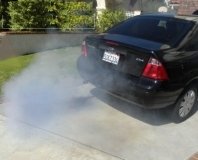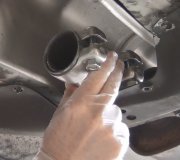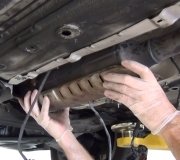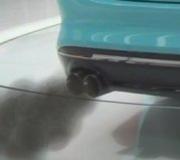First of all, it is apparent you know very little about cars, which is to be expected, so you're stuck with relying on what other people have told you over the years. We do not intentionally "wreck" your car because we know we are going to be blamed for everything that happens to it once we touch it. We do, however, make mistakes, just like doctors, accountants, carpenters, and people in every other profession. The difference is, though, mechanics are held to MUCH higher standards than are doctors. When a doctor doesn't cure you on the first visit, you happily go back numerous times or find a different doctor who starts over from the beginning. When a mechanic doesn't fix your car properly on the first visit, he is obviously incompetent or is engaging in fraudulent business practices.
The first thing you need information on is the brake system. People who try to sell you a "cleaning" service when there are no other issues are trying to drum up business to keep their mechanics busy. That is not done without the knowledge of the shop owner and / or service manager. You should have explained that brake services were performed recently and no inspection is needed "at this time". To replace a wheel bearing, the brakes on that wheel have to be disassembled, and the mechanic can't help but to look at the condition of the pads. He will note it on the repair order if he sees a problem or a chance to legitimately recommend a service.
Second, your comment about "there are no issues with the brakes" is misguided. That's like saying there's no need to inspect the airplane I'm about to fly on because there were no issues on its last flight. The most common problem is worn linings resulting in metal grinding on metal during braking. We've all heard that sound, and by that time it's usually too late to save the rotor. There is a published legal limit a rotor or drum can be allowed to wear to and a slightly larger dimension we can legally machine them to. Periodic brake system inspections, BEFORE you have an issue often catches the need for new linings before that grinding starts. That can save the expense of new rotors. You had the advantage of knowing the condition of the brakes ten months ago. There is no problem having them inspected again, but I would only agree to that if it was at no extra charge. If it's a service you have to pay for, politely say, "no thanks", especially at the cost you were quoted. $220.00 is enough to do a complete brake job on all four wheels.
When you heard the noise when you picked up the vehicle, you were right to go back immediately. The excuse, "your brakes are shot and it's your fault" could also apply to every single car on the road. This comment almost surely came from a service writer who stands behind the desk. His job is take what he thinks he heard from the mechanic and translate it into something he thinks the typical car owner will understand. You know things are going to get lost in translation, but that in itself is not an intent to defraud or deceive, but that poor communication is responsible for a lot of the bad reputation we have. To imply it's your fault for not having the brakes cleaned sounds like the guy getting his legs broken because he didn't pay back the loan shark.
Understand there are things we can do with the brakes to cure objectionable noises that might fall under the description of "cleaning", but those things are also part of a conscientious brake job. If we do not do some of these steps, there is areal good chance there will be no symptoms or problems. There are things doctors do to prevent giving you an infection in their office, but if they don't perform all of those steps, there's a real good chance nothing bad will happen to you. This brake "cleaning" might reduce the chance of a problem developing in the future, but those problems are very minor irritations at the most, like light squeals or minor brake pedal pulsations.
Ask what this "cleaning" entails and what could happen if it is not done. Then, ask why all those horrible things aren't happening to all the other cars on the road. If "brake dust" is mentioned, be aware that dust that was cleaned off is going to accumulate again starting with your very next stop. In 20 miles your brakes will look just like they were before this service.
Getting back to the description of "cleaning", that is a generic term for a number of very specific procedures we do. If necessary, I can elaborate on all of them. A professional brake job includes WAY more than just hanging new parts on the car. That is why many do-it-yourselfers run into trouble when doing their own brake work.
For the blue smoke, I don't know the laws in Canada, but here in the U.S, (Wisconsin), we have a law that requires customers to sign a repair order stipulating what is going to be done and what it will cost. Customers have to sign one of three places. The first says, "I want an estimate before any work is done". We hate that one because we have to work on the car to know what needs to be diagnosed and what might need to be done. No one else works for free, but that's what this selection is implying.
The third choice says, "Do the work, regardless of cost". We hate that one too, because there are always going to be hard feelings. You're going to assume we went looking for things to sell you that might not have been needed. On the other hand, we recognize things that are going to cause problems in the near future, even though you don't see an issue now, and we know it's in your best interest to take care of them now, before you break down on a deserted road on a Saturday night.
All of this is handled with the second choice, "Go ahead with the repairs, up to this amount", then you fill in the dollar amount based on the service writer's recommendations. Suppose you set a limit of $200.00. If the mechanic has the job almost finished but exceeds the time limit, he knows he may be working for free. He is supposed to contact the service writer who is supposed to ask you for permission to exceed the dollar amount. Most customers agree to that once they get a reasonable explanation.
"IS IT POSSIBLE THE MECHANIC THAT TEST DROVE IT GUNNED THE CRAP OUT OF IT AND THEN JAMMED THE BRAKES ON AND CAUSED BOTH THE SMOKE AND THE BRAKE PAD TO SLIP/STICK TO THE ROTOR?"
If that were true, what would he have done if he blew the engine in the middle of the road. I'd like to see him explain that to his boss. We have enough trouble already with people purposely not telling us about existing problems in hopes they can blame them on us and get them fixed for free. Only a really stupid mechanic would invite more trouble. Now, there definitely are mechanics who purposely cause problems, but they quickly get a reputation of being the one who "always has bad things happen to him". Those people don't last long at reputable shops. In my city, we have about two dozen new car dealerships and perhaps 50 or more independent repair shops. Of those, there is only one independent shop that is widely-known to cause damage so they can sell a repair service. The shop owner is behind that, is his service bays are always empty thanks to his reputation. We have two Chrysler dealerships, a former Ford dealership, a former multi-brand import dealership, a Cadillac dealership, and a GMC dealership with fantastic reputations. I used to work for one of them. Today we have a Chevy dealer that has reached new highs in developing ways to separate owners from their money. He bought the Ford and import dealerships, and now all of them have equally bad reputations. People who still insist on owning a Chevy go to other dealers 15 and 30 miles away to buy their cars.
That "slipping and sticking brakes" you mentioned, ... That's what they're supposed to do. You want them to stick to make friction and slow the car down, but you want them to slip so the tires don't skid. The brakes can handle almost any abuse we can throw at them. Even seriously overheating them is not a permanent failure once they're allowed to cool down. To add to the confusion, part of a conscientious brake job includes a final test-drive with a half dozen really hard stops, close to skidding the tires, with time in between for the linings to cool down. That stress wears the linings down slightly so they match the fine grooves in the rotors and drums. That achieves close to 100 percent contact for best brake performance from then on. I failed to do the test-drive once for a customer who was in a hurry. After 20 minutes of stop-and-go city driving, the linings, which weren't fully-seated yet, heated up to the point of developing brake fade, (no stopping power with a high and solid pedal). After they cooled down for an hour, she had no more problems. I did her a disservice by not following procedures. If you would see a mechanic doing those half dozen really hard stops, you might view that as abuse of customer's property.
The problem for all of us is the few disreputable people put all of us on the defensive. Legitimate service recommendations are automatically viewed as attempts to defraud. What other industry can you say everyone is assumed to be as dishonest as the worst in their field?
The extended warranty is another issue of contention. Fortunately at my dealership, the salespeople made car buyers aware those existed, but they never pushed them. Some dealers, GM in particular, push them real hard because the majority of the dollars you pay for them go to pay commissions to a number of people. Also, these are not extended warranties. They are service contracts, and they have a lot of fine print telling you what is not covered. These contracts are rarely a good deal for car owners. You'll always run into the one or two people who praise them and tell you how much money they saved, but they're really telling you how many expensive repairs their car needed.
Service contracts sold trough the car's manufacturer are going to require you to have the car repaired at their dealerships. Lot of good that does when you're out-of-town on a Saturday. The problem with aftermarket contracts is those companies can be notoriously slow at paying claims. They also have a lot of ridiculous requirements. They may send someone to the repair shop to examine worn parts. (They're looking for a way to shift the blame to something they don't cover). They often require old parts be sent to them. To address the slow claims payment, most shops now require you to pay the bill, then you have to submit the claim the the contract company. They leave the fighting and arguing to you to get reimbursed. Here in the U.S. We have the right to ask for a refund of the remaining part of the contract premium at any time. You can put that money toward the repair bill. Most contract companies happily do that to avoid arguing over paying a claim.
I don't have an answer for the blue smoke other than to suggest it takes a real lot to damage an engine to cause that on purpose. If the mechanic dumped oil in the intake somehow, that will work its way through and burn off. Where I would start is by meeting with the service manager to explain everything you've included here. They aren't going to want to hear, "your mechanic wrecked my car". They want specifics to include why you originally came in for service, exactly what the symptoms were, the explanations you were given by the service writer, and what is wrong immediately after the service. You know the mechanic needed to test-drive the car and should have noticed any symptoms. What was he thinking to return the car to you that way? If the service manager has heard similar complaints related to the same mechanic, that guy will be looking for a new job soon. Obviously the manager can't tell you that, but in the interest of upholding his boss's reputation, he is going to offer a solution. We dread lawsuits and the negative publicity so we do whatever we can to keep customers happy. Chrysler trains their dealers that it takes more advertising dollars to get one new customer than it takes to keep ten current customers happy and coming back. That means way more than free coffee and donuts. The service manager wants you to be happy and will do what is in his power to make that happen.
There are things he can't do. For that, the next step is to get the district manager involved. Here in Wisconsin, with Chrysler, that person visits each dealership once per month. Sometimes it's just to keep in touch and see how things are going. Other times he will be scheduled to meet with customers who have problems the dealer can't handle due to franchise agreement limitations. In this case the dealer is your advocate and will be arguing on your behalf if your beef is legitimate. District representatives usually agree with dealership findings but they have the authority to pay for repairs the dealer doesn't. Remember, the bottom line is everyone wants you to be satisfied so you'll be a repeat customer. That logic is lost on GM and its dealers, but it applies to most other manufacturers. My experience was with Chrysler which was regarded as the third highest for customer-friendly business practices. Toyota was listed second. Hyundai was the highest in the world.
Saturday, June 4th, 2016 AT 2:02 PM



